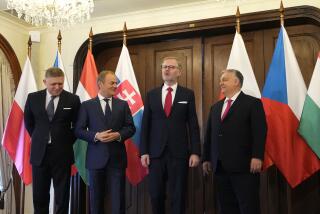Baltics’ Nationalist Leaders Lash Out at Kremlin Critics
- Share via
MOSCOW — Nationalist leaders in the three Baltic republics of the Soviet Union, reacting to Kremlin warnings that they are pushing too hard for independence, lashed back Thursday, comparing their critics to the dictators Adolf Hitler and Josef Stalin.
The Baltic Council, which includes popular front movements in Lithuania, Latvia and Estonia, issued a strongly worded statement on the eve of the 50th anniversary of the start of World War II--a period that saw the independent Baltic states annexed by the Soviet Union.
The council was responding to a warning last weekend from the Soviet Communist Party leadership that charged that unrestrained nationalism is pushing the three republics toward an abyss that threatens their “very viability.”
Threat of Force Seen
The statement from Moscow was widely interpreted as threatening physical force to keep the republics in line. It sent a shudder through the Baltic region and other Soviet republics that see in Soviet President Mikhail S. Gorbachev’s reforms the promise of independence.
In its statement Thursday, the Baltic Council charged that “the shabby old scarecrow of international imperialism is being replaced by an image of a new enemy--a domestic enemy. The authors of this campaign . . . make enemies of entire nations.”
The statement was read by telephone to a reporter in Moscow by an activist at headquarters of the Latvian Popular Front in Riga, the capital of Latvia.
Referring to the Moscow statement, the council said there has been “no such sinister and dangerous document for the cause of democracy since the death of Stalin and the (unrest) in Czechoslovakia in 1968. We appeal to all people . . . to seriously and objectively consider what is happening.” In 1968, Soviet-led troops crushed a reform movement in Czechoslovakia.
The Baltic group also complained that the party document was adopted “behind the backs of these republics, without any attempt to discuss the problems concerning them. Whether or not it was their intention, the authors of this statement appear like younger brothers of those who, in 1939, created ‘zones of influence’ and who decided the destinies of sovereign nations. . . .”
The reference to “zones of influence” relates to secret protocols in the Nazi-Soviet nonaggression pact by which Hitler and Stalin carved up Eastern and Central Europe, including the Baltics.
The council also criticized the Soviet press for what it called “half-truths, distortions of reality and lies” in its reporting on developments in the Baltic republics.
Earlier in the week, leaders in the three republics had appeared to be trying to cool the political situation. For example, the Lithuanian legislature delayed indefinitely a session that was to approve a controversial new citizenship law.
But the statement Thursday, along with a series of protests sent to Gorbachev by various Baltic civic and professional groups, appears likely to keep the restive republics near the top of the Kremlin’s domestic political agenda.
On Thursday night, the Baltic Council was drafting an appeal to U.N. Secretary General Javier Perez de Cuellar, calling on the West to act responsibly and making it clear that the Baltic republics want no interference from East or West.
Meanwhile, the news media in Moscow appeared to be trying to keep the pressure on the Baltic nationalists while at the same time calming ethnic tension. The Communist Party newspaper Pravda, for example, said it had received thousands of letters expressing concern over the situation.
More to Read
Sign up for Essential California
The most important California stories and recommendations in your inbox every morning.
You may occasionally receive promotional content from the Los Angeles Times.










